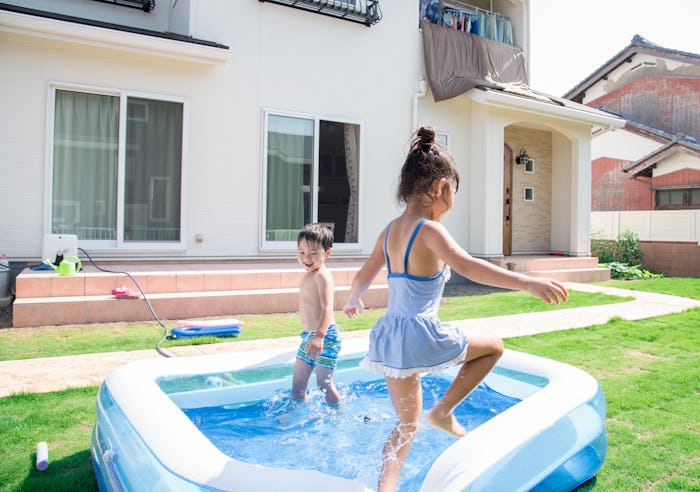When it comes to beating the heat, there's nothing like a cool dip in the pool. Even the littlest kids enjoy splashing around in the water, too. But you should know about the gross things that lurk in the kiddie pool so you can keep your family safe. After all, nothing ruins the summer fun quite like a sudden stomach bug.
Although it may look super inviting and refreshing, the kiddie pool is, at its heart, a stagnant pond in your backyard. If left out for too long, that pool water can get disgusting in no time. And even chlorinating the tiny pool may not remove all the nasties. "It's difficult to maintain the proper chlorine concentration in a small volume water and large quantity of people shedding germs and feces," said Kelly Reynolds, PhD, in Buzzfeed. When the volume of water is that tiny, it's an even trickier situation.
Still, it isn't like you have to throw away the kiddie pool and swear off this summery pastime for good. Using fresh water for each splash session, and emptying the kiddie pool of water once playtime is over, can reduce the risk of sickness, as noted by the Centers for Disease Control and Prevention (CDC). If the pool is too big to empty out every day, then it needs a filtration and disinfection system. Otherwise, it's just nasty stagnant water that can contain all sorts of unpleasant stuff. Here's a small selection of the gross stuff that can hang out in a kiddie pool.
1Shigella
This is a type of bacteria that can hang out in stagnant water. Sometimes the shigella bacteria can live in untreated swimming pools, according to the CDC. It can cause Shigellosis, an infectious disease that may cause stomach cramps, fever, and diarrhea, as further explained by the CDC. (This is partly why public pools often have those signs warning people who've had diarrhea to stay out).
2Urine
It's no secret that kids pee in pools, but this is a gross habit when the water isn't treated. For very young kids, check the swim diaper every half-hour or so, and encourage frequent bathroom breaks, as noted in Everyday Health.
3Pink Eye
Chlorine in a pool can help prevent pink eye, AKA conjunctivitis, as explained by the Water Quality & Health Council. But if one of the kids in the untreated backyard kiddie pool has pink eye, then it might spread to the others. Yuck.
4Poop
Get ready to get grossed out. Those swim diapers don't stop leakage from getting into the pool water, as noted by Childrens MD. All the more reason to empty out that pool as soon as your little one is done playing.
5E. Coli
Another potential cause of recreational water illness, E.coli can also contaminate an inflatable pool, according to the CDC. As usual, keeping sick kids out of your pool is the best way to prevent this hazard.
6Sunscreen, Sweat, & Body Oils
Basically, anything that's on your kid's body will wind up in the pool water throughout the day. This goes for sweat, dirt, sunscreen, and whatever else happens to be on their person. These things aren't pathogenic, but it still makes a pretty gross soup by the end of the day.
7Crypto
This final gross thing is particularly vile. It's the parasite Cryptosporidium, AKA Crypto. "Crypto is easily passed through feces and it causes most recreational water illness outbreaks, and even a few deaths, each year," said Reynolds in Buzzfeed. Because water is the most common way to spread this parasite, it's good to be on the alert for it. As with many of these tips, the best practice is to prevent people who have recently been sick to their stomach from entering the pool. As long as you're using fresh water and emptying the pool each time, though, the kiddie pool is still a fun activity to enjoy during the summer.
